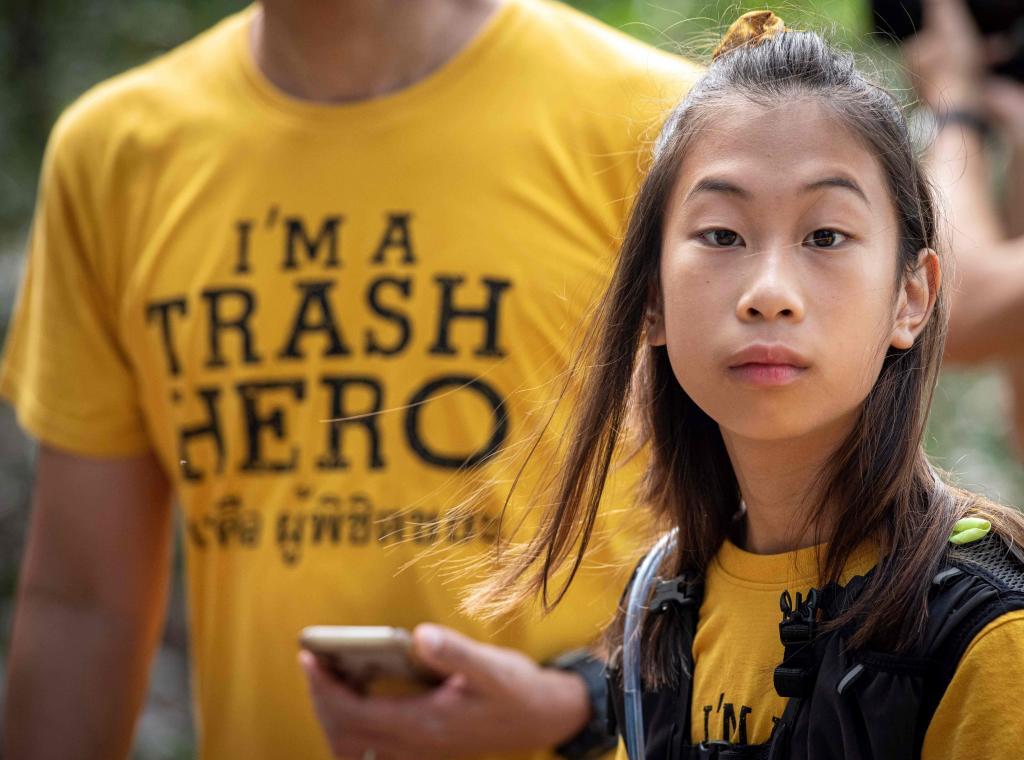- Political activism: Greta Thunberg lands in New York
- Gallery: Students stand up against climate change
- UN Summit: Millions of people participate today in climate strikes
"I am a girl at war," says Lilly, 12, who has set herself the goal of ending plastic in Thailand, drawing inspiration from the struggle of the Swedish Greta Thurnberg.
In June, this teenager of dual American and Thai nationality won her first victory : she helped convince Central, a large chain of stores, so that she does not distribute single-use plastic bags in her supermarkets.
Thailand is the sixth country in the world that contributes most to ocean pollution.
As a consequence, other distribution groups established in Thailand, including the Japanese 7-Eleven chain, ubiquitous in the country, pledged in September not to distribute those bags as of January 2020.
"It's okay that way," Lilly smiles as she approaches a bag full of rusty cans and broken bottles.
"At first, I thought I was too young for the military, but Greta [Thunberg] gave me confidence. When adults do nothing, children have to act," he adds.
Ralyn Satidtanasarn, known as Lilly, will not be in New York with the young Swedish, an icon of the fight against global warming, at the demonstration organized on September 20 before the UN climate conference.
But it will manifest in Bangkok. " My place is here . The fight must be fought in Southeast Asia," he says.
Several countries in the region - Thailand, Cambodia, the Philippines, Malaysia, Indonesia - have recently refused to become the "garbage dump" of the West, and forwarded containers filled with plastic to recycle to their countries of origin.
But these Southeast Asian countries continue to generate astronomical quantities of plastic in their own territory.
In Thailand, plastic bags are ubiquitous, to pack the food served on the street or the drinks that people take to work. An Thai uses an average of eight daily bags, about 3,000 a year, according to government data. It is twelve times more than in the European Union.
Thailand is the sixth largest contributor to ocean pollution, according to the NGO Greenpeace.
The recent death of a dugong baby - a species of threatened marine mammal - who swallowed too much plastic waste shocked on social media.
Thai authorities want to put an end to the single-use bag by 2022, according to an ambitious road map prepared earlier this year.
But some doubt its effectiveness . "No legally binding mechanism is planned, and raising public awareness will not be enough," says Tara Buakamsri, local director of Greenpeace.
In line with the movement initiated by Greta Thunberg, Lilly made a 'sitting' in front of the government headquarters. He also requested an appointment with Prime Minister Prayut Chan-O-Cha. Unsuccessfully.
The young woman can count on the support of her mother, who helps her write her speeches to UN officials or embassies.
"At the beginning, I thought it was a simple whim as a child. But don't give up on your efforts," says the mother, Sasie, who was also an environmentalist militant.
Lilly began military at age eight, after a vacation on a beach in Thailand "covered in plastics."
Since then, although sometimes he wants to stop to go play, Lilly participates in the cleaning sessions organized by the Trash Hero association.
The last one took place in Bang Krachao, a neighborhood known as the "green lung of Bangkok" but which is full of bottles, bags and other plastic waste that drag the waters of the Chao Praya River there.
Many believe in the strength of conviction of this young teenager.
But in Thailand " pressure groups are powerful and that makes any change more difficult," says Nattapong Nithiuthai, an environmentalist militant.
One of the biggest obstacles is the petrochemical sector, which is very focused on plastic, which represents 5% of Thai GDP and generates tens of thousands of jobs.
According to the criteria of The Trust Project
Know more- science
- Science and Health
ClimateThe oceans, way of becoming a nightmare for man
Paleontology The skull that has put face to 'Australopithecus anamensis'
Rains Climate change has changed the pattern of floods in Europe

